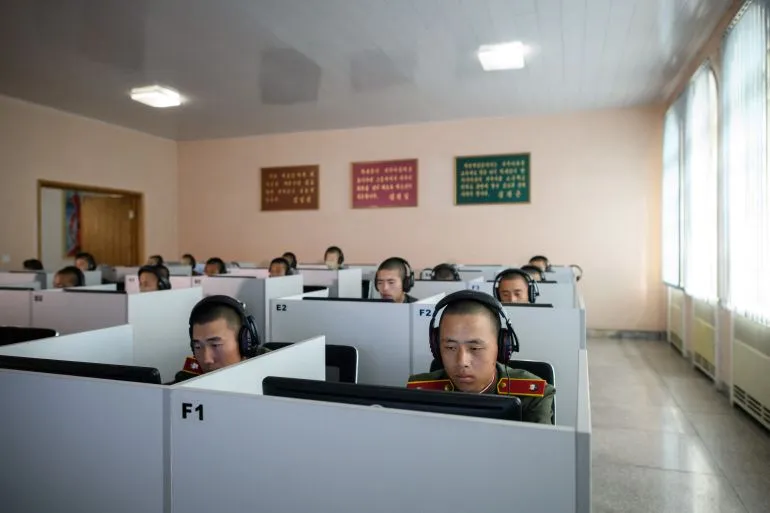North Korea’s Strained Connection: An Analysis of the Recent Internet Outage
In a nation where access to the web is tightly controlled and limited to a privileged few, the news of a major internet outage in North Korea has ignited discussions about the vulnerabilities of its digital infrastructure. According to recent reports from analysts, this interruption may not have been the result of external cyberattacks but rather an internal issue that further highlights the precarious nature of the country’s online capabilities.
The State of Internet Access in North Korea
North Korea’s internet system can be described as a dual-world phenomenon: one realm is centered around a highly restricted domestic intranet, known as Kwangmyong, while the other is a narrow gateway to the global internet that only a select few, primarily high-ranking officials and state-sanctioned entities, can access. This limited connection is accessible through a meager network of state-run services and platforms.
Due to the government’s severe censorship policies and control, the vast majority of North Korean citizens are cut off from global information, reliant instead on state media that serves to reinforce the regime’s narrative. Analysts suggest that the limited bandwidth and the age of existing infrastructure make it inherently unstable, leading to regular internet disruptions that can significantly affect both state and economic activities.
What Caused the Outage?
The recent outage that struck North Korea’s already precarious network raised numerous questions among analysts and observers. According to internet monitoring groups, while it could have been a result of external factors such as a cyberattack, experts are leaning towards the idea that it might have been an internal issue.
North Korean state-operated systems are notoriously outdated, with much of the technical infrastructure dating back to the early 2000s or even earlier. Such equipment is generally unreliable, and analysts speculate that internal issues related to maintenance or configuration might have caused this latest disruption. Existing theories suggest that the regime could be facing difficulties in managing the internal network infrastructure effectively.
The Potential Implications
Any internet disruption within North Korea raises concerns about the regime’s capacity to control information and its stability. The nation has long been viewed as a hermit kingdom, tightly regulated down to the minutiae of daily life, including access to information. Major outages can have ripple effects on both national security and domestic stability. If the government cannot ensure reliable access to the limited internet that exists, it may signal deeper systemic issues.
Furthermore, an internet outage impacts not only state communication but also commerce and perhaps even everyday interaction among citizens who may be part of the limited elite that has access to the global network. This may engender further dissatisfaction and unrest, which the regime is especially sensitive to.
Global Reactions and Implications
The international community has often been critical of North Korea’s severe control over information and the violation of basic human rights related to freedom of expression and access to information. Observers of the recent outage are pointing out that it reflects a common theme: as countries modernize and move towards greater connectivity (like 5G networks and IoT), North Korea remains trapped in its status quo.
This limitation can hamper diplomatic engagements with other countries. For instance, communications between North Korean diplomats and negotiators abroad could be severely affected, contributing to a growing wedge in international relations. Moreover, the inability to communicate effectively during crises could pose an immediate threat to national stability.
Internal Vulnerabilities vs. External Threats
This incident invites a larger examination of North Korea’s reliance on a small number of channels for external communications. Experts argue that while there is an ongoing perception of cyber threats emanating from North Korea, especially related to cybercrime and hacking into international networks, this outage points to critical internal vulnerabilities that the regime must address.
Should they choose to take advantage of this moment to strengthen their infrastructure, it is likely they would be required to acknowledge a degree of external influence and may need to engage with trusted partners who can assist in modernizing their technology. However, this could run counter to the regime’s ideology, which traditionally promotes self-reliance and skepticism toward foreign governments.
The Future of North Korea’s Digital Landscape
Looking ahead, the path of North Korea is uncertain. The regime faces multiple choices: either to improve its technological infrastructure by investing in modernization and seeking cooperation with foreign entities, or continue following its isolated route, which invites further instability.
Ultimately, the recent outage could serve as a wake-up call. It reflects not just the limitations of their internet access but underscores broader issues relating to governance, information control, and planning for future crises. Regardless of the specific cause behind the outage, it unveils the fragility of the digital landscape in a regime that already struggles against isolation and chaos.
Conclusion
As we navigate through this digital age, the trends unfolding in North Korea serve as stark reminders of the complex relationship between technology, governance, and social stability. For those studying North Korea or operating within the space of international relations, these events are critical indicators of how nations can be outpaced by the very innovations they fear.
While the immediate cause of the major internet outage remains unclear, it certainly plays into the broader narrative about the vulnerabilities inherent in maintaining a controlled internet environment reliant on outdated technology. The world will be watching closely as North Korea continues to navigate these complicated waters.







